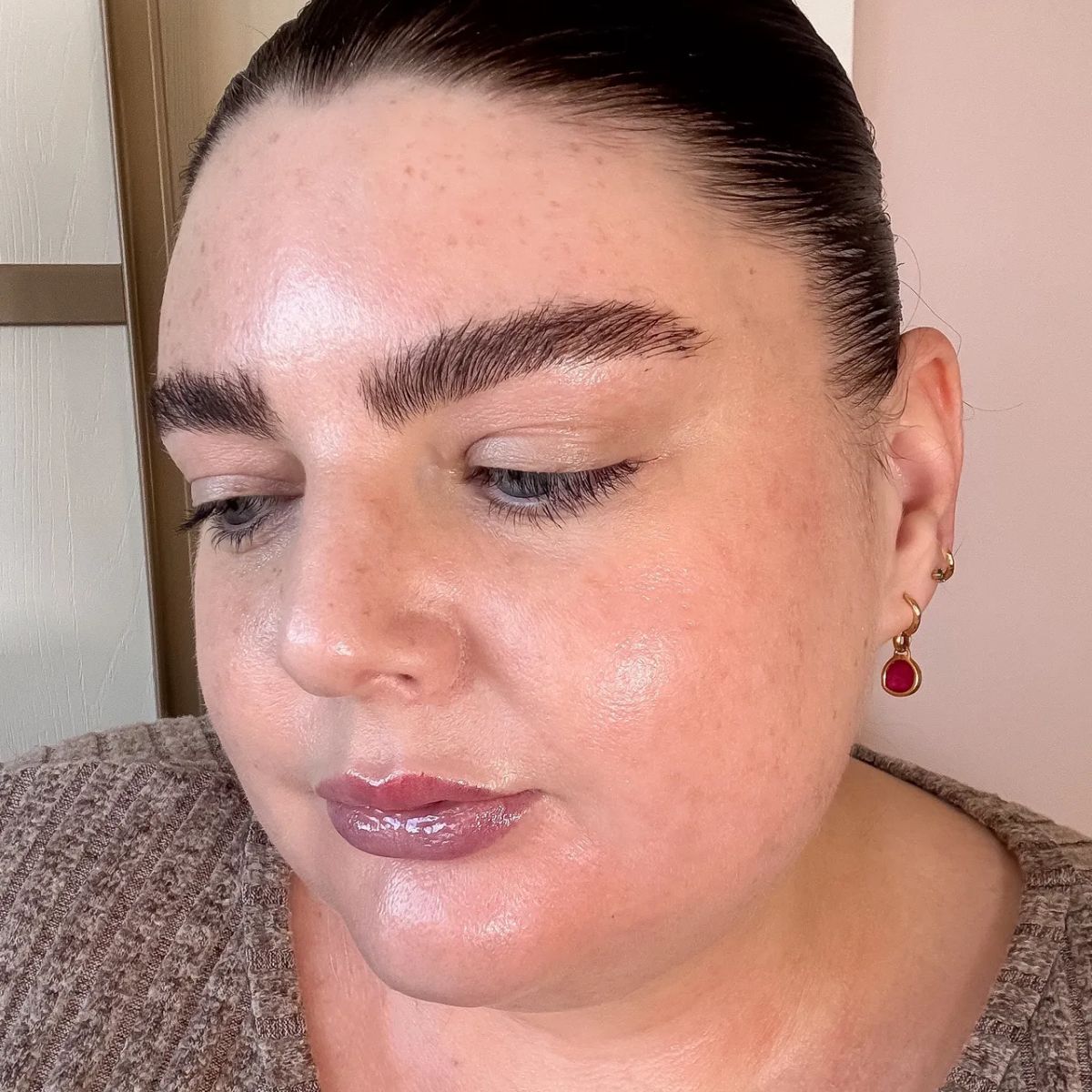Most of us would think of the gut when we hear the term “probiotic”, but these “friendly bacteria” (and their byproducts) are important in relation to our skin too.
I’ve valued probiotic skincare in my routine for a while now, since premature perimenopause has been giving me hormonal acne breakouts on one side of my jaw. I use it primarily for supporting my skin’s barrier and a healthy microbiome (the micro-environment on the surface of the skin), however, it has a host of other benefits too. Before you get worried that this is yet something else you need to add to your skincare routine, know that probiotic products also contain a lot of the other main skincare ingredients you likely already use, so think of it as killing two (or even three) birds with one stone.
Probiotic skincare can be difficult to fully understand—even for beauty editors like me—so I spoke to some experts on the subject to find out more: Dr Nyla Raja, dermatologist and cosmetic doctor; Dr Marie Drago, doctor in pharmacy and founder of probiotic skincare brand Gallinée; and Lida Alexiou, scientific director of KORRES Group. I had them answer all of the key questions about probiotic skincare to give you a good general understanding of what it is and how it could benefit you. Then, I’ll take you through a rundown of the best probiotic skincare products I recommend, across all price points. Let’s get stuck in!
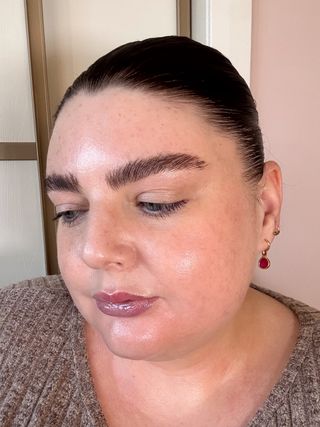
What Is Probiotic Skincare?
Dr Marie Drago tells us that whilst “there is no strict definition, in the beauty sector, it means either skincare containing parts [of] or whole bacteria, or skincare to promote the skin microbiome. The strict definition of probiotics implies that bacteria are alive in the products, but that is extremely rare, so I prefer the term ‘microbiome skincare.’ I prefer it because it’s not just by putting bacteria in a product that it can help the microbiome; the whole formula has to be thought out and designed to support the resident bacteria,” she explains.
“Probiotic skincare incorporates ingredients derived from beneficial bacteria or their byproducts, designed to nurture the skin’s natural ecosystem,” says Lida Alexiou. “These products work to maintain the microbiome’s balance, promoting a fortified skin barrier and a smoother, more resilient complexion.” She also believes that understanding probiotic skincare allows us to realise “that bacteria are not always bad; that they play a vital role in the human body and that billions of microorganisms live and work together on the skin’s surface to protect and re-enforce skin resilience.”
So, in cosmetic terms (unlike in the food industry), “probiotic skincare” generally does not mean that the product contains live bacteria, but rather that the bacteria is stabilised and formulated to allow the product to remain well-preserved. It can also refer to products that contain the byproducts of bacteria.
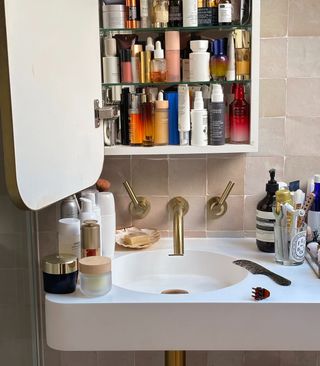
Is Probiotic and Fermented Skincare the Same Thing?
According to Dr Nyla Raja, “Probiotic skincare and fermented skincare both use microorganisms to benefit the skin, but they work in slightly different ways. Probiotic skincare [adds] bacteria or metabolites to the skin to enhance the microbiome, whilst fermented skincare involves ingredients that have undergone fermentation to improve their effectiveness. Probiotics aim to support and balance the skin’s microbiome, whilst fermented ingredients focus on improving the skin’s ability to absorb and benefit from active compounds by increasing potency and efficacy. Some products may combine both elements to offer a broader range of benefits,” she says.
What Are the Benefits of Using Probiotic Skincare?
Dr Drago has a very interesting way of looking at probiotic skincare: as a category of products that, unlike many others, “supports an existing ecosystem and balance within our skin instead of destroying [it] and starting from scratch. Because of the role of the microbiome in protection and inflammation, probiotic skincare is particularly suited to sensitive skin and skin prone to acne and eczema. This is where I see the most exciting advances—using bacteria to help with acne or eczema, instead of killing them all. The results are there and the products are much better tolerated,” she explains.
In addition to helping with skin conditions and sensitivity, probiotic skincare also “helps with moisturisation by decreasing the skin’s amount of water loss, and nourishing and protecting the skin’s barrier from bad bacteria”, according to Dr Raja.
In addition, as Alexiou explains, probiotic skincare also “enhances the skin’s ability to recover from environmental damage, contributing to a more radiant, even-toned appearance. What is groundbreaking about it is that instead of treating every symptom of stressed skin separately, you restore balance [to] your microbiome, your natural first-line barrier of the skin that was disrupted in the first place. This way, you can address all symptoms at once and protect your skin from future imbalance. The human body is a genius—you just need to support and optimise the way it naturally works,” she says.

Who Is Probiotic Skincare Suitable for?
Dr Raja explains that “probiotic skincare can be suitable for a wide range of skin types and concerns. For sensitive skin, probiotics can help reduce irritation and support the skin’s natural defences, helping to calm redness and inflammation and reduce reactions to environmental stressors. For acne-prone skin, probiotics promote healthy bacteria and reduce the growth of acne-causing bacteria, bringing balance to the skin and supporting skin healing.
“For rosacea and inflammatory skin conditions, probiotics help to soothe irritation and prevent flare-ups. For dull and dehydrated skin, probiotics help maintain the skin’s moisture level, leading to a more hydrated, glowing complexion. For ageing skin, probiotics support collagen production, promoting a smoother, more youthful appearance. For post-treatment skin such as [after] microneedling or peels, probiotics are used to restore the skin’s natural flora and assist in speeding up skin healing, reducing inflammation and irritation.”
She reminds us that “in short, probiotics are suitable for many skin types, however, if you have a specific skin condition or concern, it’s always best to consult with a dermatologist to ensure your skincare is suitable and the right choice for you.”
What’s the Difference Between Probiotic and Prebiotic?
“Probiotics are usually lysate-based beneficial bacteria used in skincare to support the microbiome,” says Alexiou. “Prebiotics serve as the nourishment for these probiotics, fostering a healthy balance. In simple [terms], probiotics are the good bacteria and prebiotics are their food. Together, they create a dynamic approach to supporting skin health. When a product contains both prebiotics and probiotics, it essentially contains a live system that works together to build skin resilience.”
Dr Raja agrees that “prebiotics and probiotics both work to support the skin’s microbiome, however, they play different roles in the maintenance of your overall skin health. Probiotics introduce beneficial bacteria or their byproducts to the skin, influencing the microbiome, whereas prebiotics support the growth and activity of good bacteria already present. Prebiotics provide food to help the good bacteria thrive, essentially nourishing and strengthening the skin’s natural ecosystem. Many skincare products combine both to work in synergy, as this creates a balanced, healthy environment, leading to longer-lasting results.”
Are There Any Downsides to Using Probiotic Skincare?
“No, and that’s the great thing about using pre, pro or postbiotic ingredients—they are natural, they work and they are extremely safe and well-tolerated by the skin,” says Dr Drago. “After all, we’ve been co-evolving with these good bacteria for two million years, so it’s really about rediscovering what they can do for us.”
Alexiou agrees. “Probiotic skincare is generally safe and well-tolerated. Rarely, individuals may experience a mild adjustment phase as the microbiome recalibrates.” She adds, “Most products utilise stabilised probiotic derivatives, minimising storage concerns.”
Echoing this, Dr Raja also advises that potentially, highly sensitive skin could experience side effects or varied results. “It’s worth noting that probiotic skincare is not universally effective. Some skin can benefit from dramatic improvements, whilst others may not respond well to probiotics and the results may not be as significant or as expected. Those with very sensitive or highly reactive skin may experience irritation or allergic reactions when using probiotic skincare, including redness, itching or a burning sensation. Live bacteria in probiotics could potentially cause an imbalance for individuals who already have disrupted skin or those who are allergic to a specific strain of microorganisms.”
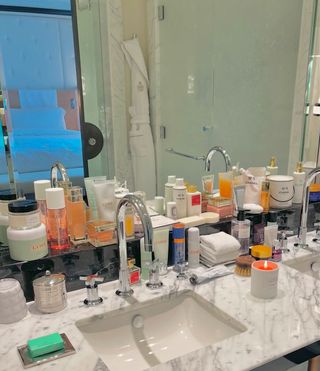
Do Probiotic Skincare Products Expire Quickly?
As Alexiou explains above, “Most probiotic formulations use stabilised components like lysates or filtrates, ensuring longevity comparable to other skincare products. However, products featuring live bacteria may have stricter usage guidelines.”
Gallinée is one of those brands. Dr Drago says the brand “tries to keep preservative levels to a minimum, as their role is to kill bacteria, so indeed, [this] means an expiry date. This [allows] us to design products for even the most sensitive skin. The few existing brands that keep live bacteria in their products usually have a short shelf-life and have to be kept in the fridge.”
How Should You Use Probiotic Products in Your Skincare Routine?
“Microbiome skincare is great at two things: respecting the existing microbiome and soothing [the skin]. I usually say that the best way to integrate [it into] a skincare routine is at the very start and the very end. At the very start, because the way you cleanse is going to affect your microbiome a lot, so it’s best to use a gentle, pH-appropriate cleanser. If your routine is a bit rough on your skin [thanks to] acids, retinol or antibacterials, a good microbiome skincare product will soothe, rebuild the barrier and make sure only the good bacteria come back,” says Dr Drago.
Dr Raja advises using probiotic serums or treatments “after cleansing and using an optional toner or essence. It is then that probiotic serums or treatments should be applied—before your moisturiser.” She also advises that with products containing live bacteria, you should “avoid acids and retinoids which can disrupt the balance.” Consider taking a break from these more intense ingredients or use them on alternating days.
The 12 Best Probiotic Skincare Products, Tried and Tested:
1. Gallinée Probiotic Youthful Serum
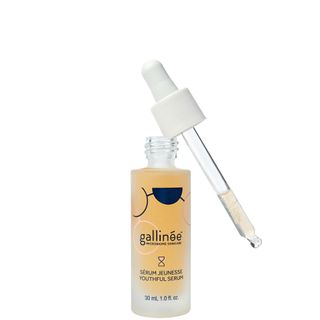
Gallinée
Probiotic Youthful Serum
This light water-based serum absorbs beautifully into the skin, plumping it with hydration.
Pros: In addition to probiotics and prebiotics, this serum also contains lactic acid, a gentle exfoliator. This all adds up to brightened skin with a more refined texture too. Remember that bird and those stones?
Cons: There really aren’t any. The results images from the brand’s trials of this product are very impressive.
Customer Review: “I noticed a difference after only one use! Amazing effect from just one use! Skin is smoother and more radiant [and] the complexion is overall brighter. Also, [it is] a nice texture, lightweight and not sticky. I have oily, acne-prone skin and it suits me well.”
2. Korres Greek Yoghurt Probiotic Skin-Supplement Serum
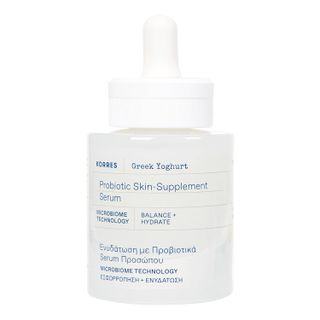
Korres
Greek Yoghurt Probiotic Skin-Supplement Serum
This lightweight, milky serum is a dream to apply. It soothes and hydrates instantly.
Pros: As well as the prebiotics and probiotics, this is formulated with Greek yoghurt to have a cooling and soothing effect on sensitive skin. It’s gentle and of 93.7% natural origin.
Cons: You aren’t going to want to stop applying this, so be prepared to repurchase regularly.
Customer Review: “I’ve been using this serum for a while now and I’m really impressed. It absorbs quickly and doesn’t leave any greasy residue, which is a big plus. The serum has a light texture and a neutral scent, making it very pleasant to use. After applying, my skin feels noticeably hydrated and refreshed.”
3. Allies of Skin Molecular Saviour Probiotics Treatment Mist
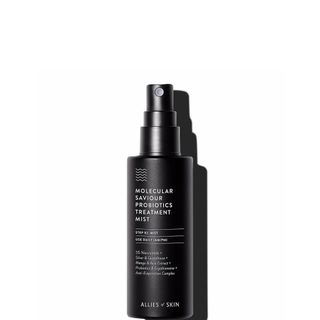
Allies of Skin
Molecular Saviour Probiotics Treatment Mist
This is a very effective toning mist that contains probiotics, antioxidants, niacinamide, zinc, silver and mango extract (mango extract balances the microbiome and regulates sebum production. Who knew?!).
I spoke with Allies of Skin brand founder Nicolas Travis, who says the probiotics in this product are all about “stimulating the natural defences of the skin so it functions better.” It’s designed to “balance the skin and enhance [the] microbiome by supporting barrier health, reducing redness and helping to reduce breakouts.”
Pros: It’s packed with amazing ingredients to nourish, protect, balance, refine texture, minimise breakouts, hydrate and soothe irritation.
Cons: For a face mist, this is very expensive, especially as brand Travis says that probiotics “take time to work, so using [the product] regularly is recommended.”
Customer Review: “I like this but it’s probably too spendy for daily use. On the positive side, I have experienced fewer breakouts and it’s helping with hyperpigmentation, but I often need to follow up with a hydrating mask. There are better options available at a lower price point.”
4. Garnier Skinactive Probiotic Repairing Sheet Mask
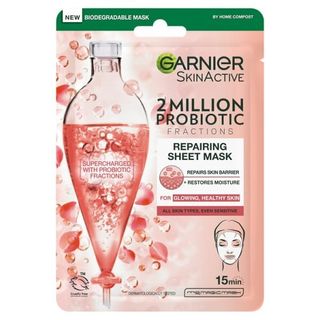
Garnier
Garnier Skinactive Probiotic Repairing Sheet Mask
We all know that I’m a sheet-mask addict and lover of Garnier’s in particular, and this one is no exception. It’s a hydrating and affordable way to top up your skincare probiotics.
Pros: Contains probiotic fractions, a key ingredient in the more expensive Vichy serum below, cultured by a fermentation process to strengthen the skin barrier and encourage repair.
Cons: At less than the price of a coffee, I’m not complaining.
Customer Review: “I used this after I came back from holiday. My skin was dried out from sun, sea and lack of care so was in need of some TLC. I used this easy-to-use sheet mask and my skin was all plumped up after it and looked much healthier than before.”
5. Vichy Minéral 89 Probiotic Fractions Recovery Serum for Stressed Skin With 4% Niacinamide
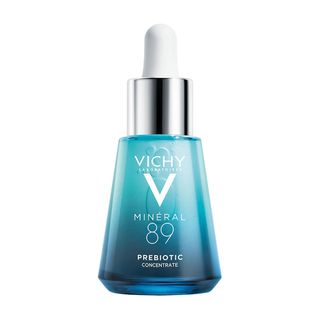
Vichy
Minéral 89 Probiotic Fractions Recovery Serum for Stressed Skin With 4% Niacinamide
This serum has a bit of a cult status because of its ingredients’ power to repair stressed and irritated skin whilst plumping.
Pros: The probiotic fractions are in there for intensive skin-barrier repair, alongside soothing Vichy volcanic mineralising water, brightening and texture-refining niacinamide and hydrating hyaluronic acid, as well as antioxidants to protect and strengthen skin against environmental aggressors.
Cons: It has a slightly thicker texture than the other serums in this list, and can leave a slight tackiness depending on how much you apply.
Customer Review: “I have been loving using this serum. Firstly, the packaging is beautiful! It comes in a lovely glass bottle with a pipette. The serum has a nice viscosity to it, with a ‘thicker than water’, gel-like texture. I also take it up under the eyes, as the serum visibly plumps and hydrates the skin, so it’s great to help plump up fine lines around the eyes. It leaves my skin feeling calm, soft and nourished. My skin is definitely looking clearer, even-toned and more radiant since using this serum. I would highly recommend.”
6. Aurelia London The Probiotic Concentrate
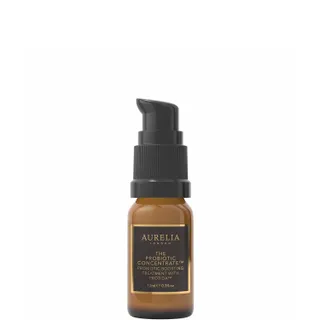
Aurelia London
The Probiotic Concentrate
Texture-wise, this treatment sits between a gel serum and gel moisturiser and adds a beautiful dewiness to the skin.
Pros: Contains the brand’s unique PROTIDA complex of peptides, bifida ferment lysate (a fermented by-product of the probiotic bifidobacterium) and probiotics to boost the skin’s natural immunity, reduce inflammation, improve collagen production, reduce cellular damage and enhance skin repair.
Cons: This is a pricey one, especially in terms of how much product you get for your money.
Customer Review: “This serum is great, it’s super-gentle on your skin and I have seen a visible improvement in my skin. My blemishes have reduced and my skin tone is much more even—love it!”
7. Cultured Biomecare Biome One Cleansing Balm
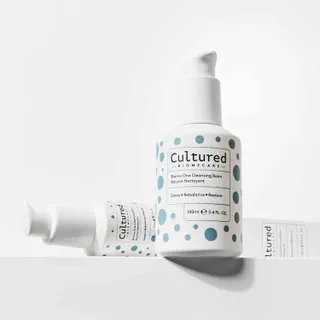
Cultured Biomecare
Biome One Cleansing Balm
This thick, oily cleanser feels beautifully indulgent to apply. It’s designed to cleanse and purify without irritating your skin barrier or microbiome. It moisturises, keeps your skin’s pH balanced, moisturises, soothes, strengthens the skin barrier and nourishes. It contains prebiotics, fermented algae and micro-algae (a source of probiotics), fermented oils and antioxidants.
Pros: All of this brand’s products are designed around nurturing and balancing your microbiome, so the formulators really are experts in their field. Also, fermented oils penetrate the skin better than regular plant oils.
Cons: I’d class it as an oil cleanser rather than a balm.
Customer Review: “This cleanser is so gentle on the skin. I’ve been using it for around two years now, and normally I would want to change my cleanser by now because my skin would not be enjoying it anymore. This has not been the case with this cleanser—nothing I have tried compares to how good my skin feels after using [it]. It really helped my dry skin using the range of Cultured Biomecare products, but now, I only need the cleanser at night—my skin doesn’t feel like it needs additional products like moisturiser or serum until after the cleanse in the morning.”
8. Balance Me Pre + Probiotic Radiance Cream
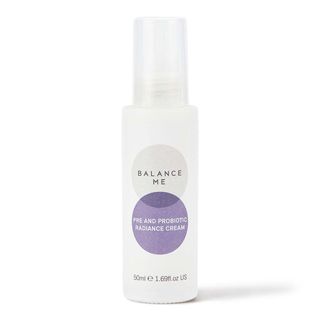
Balance Me
Pre + Probiotic Radiance Cream
This light gel moisturiser contains both prebiotics and probiotics for robust results. Balance Me’s signature bio-active prebiotic and probiotic complex boosts radiance and protects the skin from environmental damage, whilst olive squalane and multi-molecular weight hyaluronic acid boost hydration and lock moisture into the skin. There’s also willow bark and PHAs to gently exfoliate, and soothing and balancing manuka honey.
Pros: The ingredients are impressive, and it does so much.
Cons: Some skins won’t like that the cream is scented with citrus, floral and botanical extracts,
Customer Review: “I have fallen in love with this cream! My skin has been prone to breakouts for a long time but [it] has honestly never been better since using this product. Granted, I’ve been using retinol and a vitamin C serum alongside, but I can confidently say that this cream has significantly contributed to my skin finally being consistently clear—and more radiant too! This cream is now a staple part of my skincare routine. Highly recommend.”
9. Liz Earle Pro-Biotic Balancing Milk Cleanser
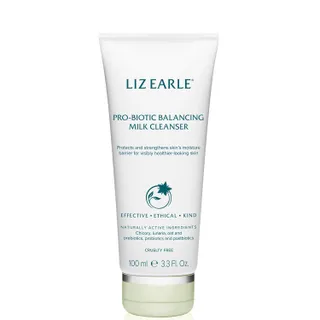
Liz Earle
Pro-Biotic Balancing Milk Cleanser
Liz Earle is known for its cult Cleanse & Polish cleanser, but I think this is the one that steals the show for those with stressed skin. The milky formula leaves skin soothed and comfortable.
Pros: Contains prebiotics, probiotics and postbiotics for a comprehensive, all-round approach to microbiome health; as well as chicory, lunaria oil, jojoba oil and oat extract to soothe and strengthen the skin barrier.
Cons: At £18, there isn’t really any reason not to give this a go.
Customer Review: “I used to suffer from acne-prone skin but since using this, it has all cleared up. I use [it] as a second cleanser after removing makeup. Love it!”
10. The Nue Co Barrier Clear Treatment
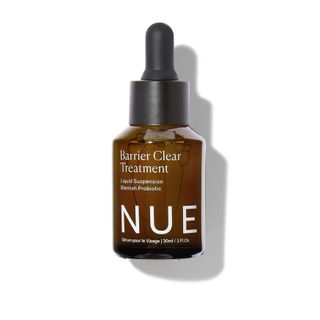
The Nue Co
Barrier Clear Treatment
This probiotic treatment has been designed for blemish-prone skin. It uses clinically studied probiotic extracts to target the root cause of breakouts—aka an imbalanced microbiome.
Pros: It weakens acne-causing bacteria and regulates skin’s oil production, which could be game-changing for acne and blemish-prone skin. Has been shown to significantly reduce inflammatory pustules, whiteheads and blackheads.
Cons: It’s really just for those with blemish-prone skin.
Customer Review: “All types of acne, from cystic to closed comedones, [have] bothered me for years, and I was shocked this actually helped. I have noticeably less breakouts and the ones I do have are less severe. The serum itself is thin and a little hydrating, and so plays well with all other skincare.”
11. Antipodes Cream Culture Probiotic Night Recovery Water Cream
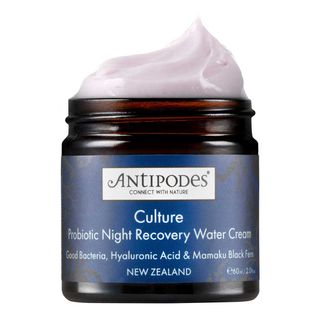
Antipodes
Cream Culture Probiotic Night Recovery Water Cream
This gel moisturiser is wonderfully hydrating, refreshing and soothing. It contains Kalibiome AGE Probiotic, hydrating plant-based hyaluronic acid and skin-firming, cell-renewal boosting Mamaku black fern from New Zealand.
Pros: The Kalibiome AGE Probiotic is clinically shown to decrease redness by 18.3% and reduce wrinkle depth by 13.1%.
Cons: There’s a pure plant fragrance that’s quite strong (rose, citronella, and geranium), so it could be irritating to extremely sensitive skin, or off-putting to those who don’t like a floral fragrance.
Customer Review: “I have been struggling for over a year with oil moisturisers until I finally gave in and ordered this. Best decision! It’s such a great weight for combination skin and doesn’t leave a greasy residue. It sinks into my skin so easily and smells divine. Plus, I love the fact that it has probiotics in it. Will definitely buy again.”
12. Elemis Dynamic Resurfacing Pads
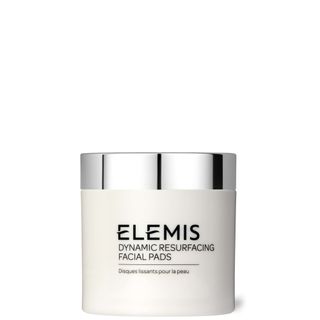
Elemis
Dynamic Resurfacing Pads
This is one of those “multiple birds, one stone” products again. You’re getting an exfoliating acid pad with the benefits of a probiotic ferment complex.
Pros: Sloughs away dead skin cells without compromising the skin barrier and reduces hyperpigmentation.
Cons: If you don’t want an AHA acid in your routine, choose one of the other probiotic products I recommend.
Customer Review: “I use these pads twice a day. I was sceptical at first as nothing had ever worked before. I couldn’t be happier as my skin had never been in such good condition. My pores are now non-existent and my makeup goes on so well in the morning. My blemish scars have disappeared and my sun damage seems to have reduced. I’ve only been using it for a couple of weeks now, but when I run out, I will be purchasing again. Well done, Elemis!”

